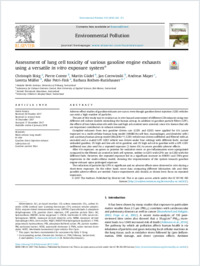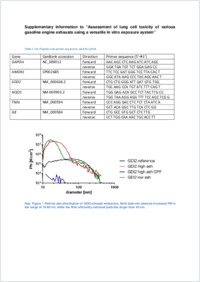Assessment of lung cell toxicity of various gasoline engine exhausts using a versatile in vitro exposure system
- Bisig, Christoph Adolphe Merkle Institute, University of Fribourg, Switzerland
- Comte, Pierre Laboratory for Exhaust Emission Control, Bern University of Applied Sciences, Biel-Bienne, Switzerland
- Güdel, Martin Laboratory for Exhaust Emission Control, Bern University of Applied Sciences, Biel-Bienne, Switzerland
- Czerwinski, Jan Laboratory for Exhaust Emission Control, Bern University of Applied Sciences, Biel-Bienne, Switzerland
- Mayer, Andreas Technik Thermische Maschinen, Switzerland
- Müller, Loretta University Children's Hospital Basel, Switzerland
- Petri-Fink, Alke Adolphe Merkle Institute, University of Fribourg, Switzerland - Chemistry Department, University of Fribourg, Switzerland
- Rothen-Rutishauser, Barbara Adolphe Merkle Institute, University of Fribourg, Switzerland
-
01.04.2018
Published in:
- Environmental Pollution. - 2018, vol. 235, p. 263–271
English
Adverse effect studies of gasoline exhaust are scarce, even though gasoline direct injection (GDI) vehicles can emit a high number of particles. The aim of this study was to conduct an in vitro hazard assessment of different GDI exhausts using two different cell culture models mimicking the human airway. In addition to gasoline particle filters (GPF), the effects of two lubrication oils with low and high ash content were assessed, since it is known that oils are important contributors to exhaust emissions. Complete exhausts from two gasoline driven cars (GDI1 and GDI2) were applied for 6 h (acute exposure) to a multi-cellular human lung model (16HBE14o-cell line, macrophages, and dendritic cells) and a primary human airway model (MucilAir™). GDI1 vehicle was driven unfiltered and filtered with an uncoated and a coated GPF. GDI2 vehicle was driven under four settings with different fuels: normal unleaded gasoline, 2% high and low ash oil in gasoline, and 2% high ash oil in gasoline with a GPF. GDI1 unfiltered was also used for a repeated exposure (3 times 6 h) to assess possible adverse effects. After 6 h exposure, no genes or proteins for oxidative stress or pro- inflammation were upregulated compared to the filtered air control in both cell systems, neither in GDI1 with GPFs nor in GDI2 with the different fuels. However, the repeated exposure led to a significant increase in HMOX1 and TNFa gene expression in the multi-cellular model, showing the responsiveness of the system towards gasoline engine exhaust upon prolonged exposure. The reduction of particles by GPFs is significant and no adverse effects were observed in vitro during a short-term exposure. On the other hand, more data comparing different lubrication oils and their possible adverse effects are needed. Future experiments also should, as shown here, focus on repeated exposures.
- Faculty
- Faculté des sciences et de médecine
- Department
- Département de Chimie
- Language
-
- English
- Classification
- Chemistry
- License
- License undefined
- Identifiers
-
- RERO DOC 309443
- DOI 10.1016/j.envpol.2017.12.061
- Persistent URL
- https://folia.unifr.ch/unifr/documents/306729
Other files
Statistics
Document views: 90
File downloads:
- fin_alc.pdf: 159
- fin_alc_sm.pdf: 62

